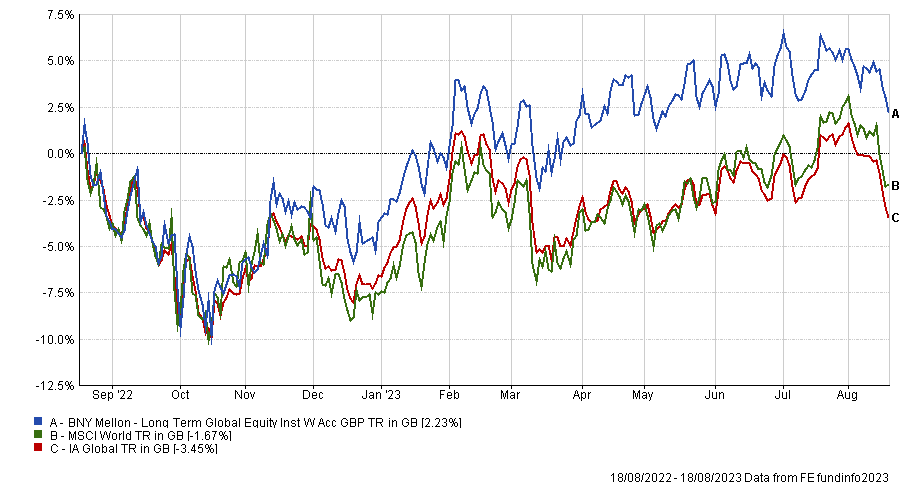Not just investment books can teach something about investing – sometimes learning about the history of the Mediterranean, synthetic biology or the Netherlands-based investigative journalism group Bellingcat can prove more useful than you thought in managing your portfolios.
That’s what happened with the investment team at Edinburgh-based Walter Scott & Partners behind the £1.8bn BNY Mellon Long-Term Global Equity fund, whose picks for this instalment of Trustnet’s Investors’ Bookshelf make for an eclectic list.
Performance of fund vs sector and index over 1yr
Source: FE Analytics
Books on investing
Charlie Macquaker, executive director at Walter Scott & Partners chose 1955’s The Great Crash, 1929 by JK Galbraith, which he has re-read many times during the year and is especially good when in the midst of a bull market.
“I’ve experienced a number of bear markets over the course of my career. They are not much fun. The only certainty is that they all come to an end at some point,” he said.
“While every bear market is different, the truth eventually emerges. Good companies survive, bad companies and bad ‘players’ get found out. Financial resilience wins over. It is always good to remember John Kenneth Galbraith’s timeless description of ‘the Bezzle’ in this renowned book, The Great Crash. It’s a book that is full of lessons on the market cycle.”
Investment manager and co-head of research Alan Lander invited investors to be humble and recognise the role of luck in markets (and life) by recommending Fooled by Randomness: The Hidden Role of Chance in the Markets and in Life by Nassim Nicholas Taleb, published in 2001.
“This is the book I have returned to most often over the course of my career. In the short-term, randomness is a key driver of financial markets. This book acknowledges the role of the unpredictable in our industry and cautions against the search for reason when none exists,” he said.
“Nassim Nicholas Taleb also argues that more often than not it is chance, not ability, that determines our personal successes or failures. A humbling, thought provoking, yet entertaining read.”
Statistics is something investors are constantly bombarded with, but facts and figures can sometimes be used to confuse rather than enlighten, so how do you chose which to believe in and which to trust?
Investment analyst Michael Scott suggested How to Make the World Add Up: Ten Rules for Thinking Differently About Numbers by Tim Harford (2020).
“Statistics can be problematic because of incomplete collection of data, poor presentation or simply measuring something that the data isn’t designed to show,” he said.
One example shared in the book is that, although the number of births and the number of storks in a country aren’t correlated to other, a statistician could claim ample evidence that storks do deliver babies.
“Statistics can be so focused on proving a thesis numerically that the bigger picture is forgotten,” said Scott.
“The book also includes 10 rules for assessing whether a statistic can be trusted or not, giving you an understanding of the pitfalls that exist in each part of this process and a framework to analyse facts and figures with a healthy level of scepticism – all aspects that are integral to investment research and decision making.”
Books to expand your horizon
What can the Mediterranean teach you about investing? A lot, according to investment manager Fiona Macrae, whose pick was The Middle Sea: A History of the Mediterranean by John Julius Norwich (2007).
“Learning from the past is an important part of making investment decisions for the future, and this account of the rise and fall of the civilisations around what the Romans viewed as ‘The Centre of the World’ (hence the name Mediterranean) reminds us that there are often economic reasons behind the rise and falls of various empires,” she said.
“Just as importantly, it highlights that some of the issues we are faced with today politically, socially and economically across southern Europe are essentially legacy issues that have long been left unresolved.”
Elsewhere, Alan Edington, investment manager in Walter Scott & Partners’s ESG Integration team recommended We are Bellingcat: An Intelligence Agency for the People by Eliot Higgins (2022).
“While our work in investment research cannot be compared to investigative journalism, some of the array of research tools deployed by the investigative journalism group Bellingcat do have relevance,” he said.
“Information that in previous decades would simply not have been available is now online and this not-for-profit group trawl through it in staggering detail for the benefit of us all. The account of the founding of the collective is fascinating but understanding how they work together from far-flung locations is equally insightful.”
Finally, investment manager Tom Miedema chose The Genesis Machine: Our Quest to Rewrite Life in the Age of Synthetic Biology by Amy Webb and Andrew Hessel (2022).
“Over the past few decades, many of the remarkable steps forward in synthetic biology have gone largely unnoticed by those outside this field, but the scientific steps forward that allowed the rapid development of Covid-19 vaccines brought synthetic biology into mainstream conversation,” he said.
“It is a subject I’ve spent a lot of time researching over the past few years and this is the book that I wish I’d read earlier. It really is a definitive guide to one of the most exciting areas of science today, and everyone should read this story to get inspired by the writer’s passion for the subject and its significance.”





